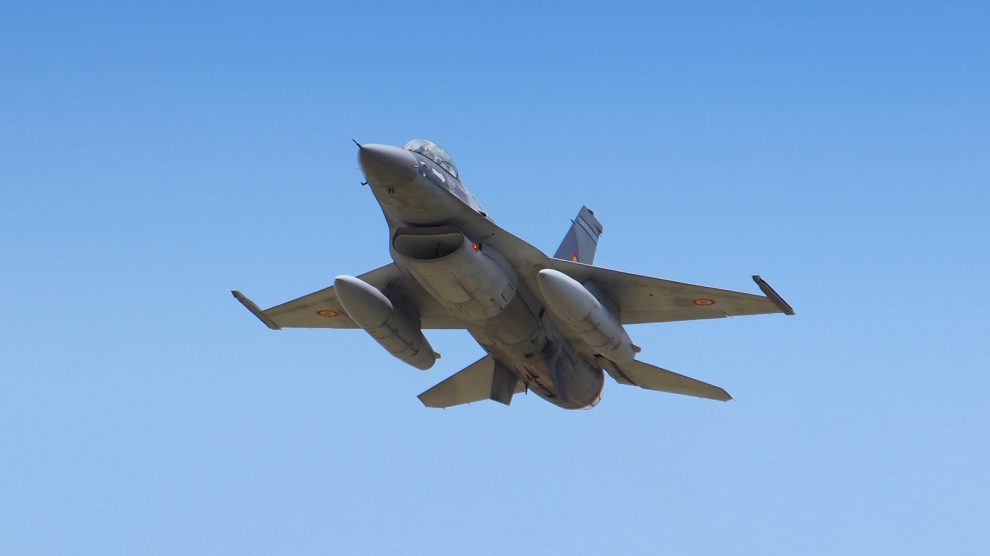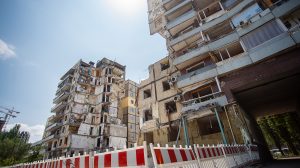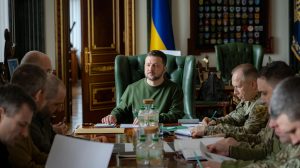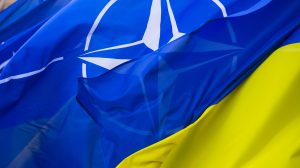You can read all of our coverage of Russia’s invasion of Ukraine, including explainers and articles offering context and background information here.
Russia’s invasion of Ukraine
Ukraine’s president Volodymyr Zelensky visited London this week, addressing the UK parliament, meeting with King Charles and holding talks with PM Rishi Sunak. “Finally,” quipped one UK journalist, “a decent leader in 10 Downing Street.”
Speaking at Westminster Hall, Zelensky told MPs that, “I know freedom will win. I know Russia will lose”. he also thanked the UK for its support, which he said, “has been firm from day one”.
Zelensky presented the speaker of parliament, Lindsay Hoyle, with a Ukrainian pilot’s helmet, on which was written: “We have freedom, give us wings to protect it”.
Zelensky has been pushing Ukraine’s allies to supply fighter jets for some time. The UK is the most likely source, given that both the US and Germany recently ruled out the possibility of supplying Ukraine with jets. A British offer to train Ukrainian pilots on modern NATO fighter jets has been widely viewed as a hint to the rest of NATO that at some point it may have to provide modern jets to help Ukraine defend its airspace.
On Thursday, Zelensky moved on to Brussels where he gave a rousing speech the European Parliament that that focused heavily on the humanitarian and democratic values Ukraine shares with the European Union.
“Ukraine is going to be a member of the European Union,” he said.
Zelensky is also hoping that the European Council, meeting today (February 10), will agree to use frozen Russian assets to finance Ukraine’s reconstruction. Estonia is pressing ahead with legislation that would allow it to confiscate Russian assets frozen by sanctions and use the revenue to help in the reconstruction of Ukraine.
The leaders of all three Baltic countries, as well as Poland, now want the EU as a whole to advance work on a Russian asset-grab ahead. Around 300 billion US dollars of Russian foreign reserves are frozen in sanctions-participating jurisdictions, including France, Germany, Japan, the US, the UK, Austria, Canada.
The European Commission in December proposed pooling those assets into a purpose-built fund and actively managing them to generate profit, which would be used to finance Ukraine’s reconstruction. But under that plan, the original capital would be returned to Russia as part of peace negotiations.
SpaceX has limited Ukraine’s ability to use its satellite internet service for military purposes – after reports that Kyiv has used it to control drones.
Early in the war, Ukraine was given thousands of SpaceX Starlink dishes – which connect to satellites and help people stay connected to the internet. But it is also said to have used the tech to target Russian positions with drones – which SpaceX says goes against the service agreement.
The Starlink technology was “never meant to be weaponised,” SpaceX president Gwynne Shotwell said at an event in Washington DC on Wednesday. She made reference to Ukraine’s alleged use of Starlink to control drones, and stressed that the equipment had been provided for humanitarian use.
Unmanned aircraft have played an important role in the war, having been used by Kyiv to search out Russian troops, drop bombs and counter Moscow’s own drone attacks.
The international team investigating the 2014 downing of Malaysia Airlines Flight 17 (MH17) by a missile has convincing evidence that Russian President Vladimir Putin personally signed off on a decision to allow the Russian missile system into Ukraine, Dutch prosecutors said on Wednesday.
The BUK-TELAR missile system was used to shot down MH17 on its way from Amsterdam to Kuala Lumpur over eastern Ukraine on July 17, 2014, investigators said.
However, they said the evidence was not enough to lead to prosecution.

Other news
Kosovo’s prime minister Albin Kurti said on Monday he accepted a proposed European Union plan aimed at normalising relations with Serbia despite concerns over Western demands to give more rights to local Serbs. Last month Western envoys told Kosovo and Serbia they should state whether they accept the 11-point plan or face repercussions from the EU and United States. Serbia’s President Aleksandar Vučić told parliament last month that Western envoys warned Belgrade that if Serbia did not accept the proposal, its EU membership talks would be halted and access to pre-accession funds and investments denied.
Serbia meanwhile plans to invest 100 million euros in the construction of an oil pipeline to Hungary which will help diversify the country’s energy sources, the energy ministry said on Thursday. Officials of state-owned oil storage operator Transnafta, which will carry out the construction work on Serbian territory, will start talks on the technical details of the project with representatives of the Hungarian side, the energy ministry said in a statement. The 128-km pipeline will link the northern Serbian city of Novi Sad to Adje in the south of Hungary.
German Foreign Minister Annalena Baerbock this week called for a reopening of a key corridor to the disputed Nagorno-Karabakh region, after talks with her Armenian counterpart. Baerbock, whose country leads a European Union mission in the region, told reporters that the escalating humanitarian situation made it essential that “the blockade end immediately”. Since mid-December, a group of Azerbaijanis has been blocking the only road into Karabakh from Armenia to protest what they claim is illegal mining causing environmental damage.
The Biden administration on Tuesday approved a 10 billion US dollars arms sale to NATO ally Poland. The State Department notified Congress that the sale comprises mid-range, mobile HIMARS artillery rocket systems, associated ammunition and related equipment. Poland and other eastern flank NATO allies become increasingly concerned about the possibility of a new Russian offensive in Ukraine along their borders as the one-year anniversary of Russia’s invasion approaches toward the end of the month.
Ryanair boss Michael O’Leary has sparked a war of words after he and his airline criticised the Polish government’s “crazy” plans to spend billions on building a large new hub airport. The row began after an interview with Polish news website Onet, published on Wednesday, in which the outspoken O’Leary described the proposed Solidarity Transport Hub (CPK) as a “stupid project”. He said Poland would be better off investing the money in improving existing airports.
Hungarian ministers who’ve assumed powerful positions at public trusts overseeing universities have resigned from those posts to help resolve one of a series of conflicts with the European Union. The EU has cut off Hungary from its flagship Erasmus academic scholarship program as well as crucial university funding, citing political influence over higher education. Including Covid-recovery funds, the EU has effectively suspended more than 30 billion US dollars in payments due to graft and rule of law concerns.
Only a week after a mass trial of people arrested over their involvement in unrest in Uzbekistan’s autonomous republic of Karakalpakstan ended, another 39 defendants are in the dock on similar charges. Defendants in this second trial, which opened on February 6, also in the city of Bukhara, several hundred kilometers from Nukus, where the disturbances occurred, include lawyers, journalists, bank employees, drivers, and unemployed people. The trial that closed on January 31 saw all 22 of the accused found guilty.
Miroslav “Ciro” Blažević, who coached the Croatian national soccer team to the semi-finals of the 1998 World Cup in France, died this week aged 87. His family and friends said Blažević died at a Zagreb hospital on Wednesday after a long battle with prostate cancer. The “coach of all coaches,” as he was known in his home country of Croatia, led four national teams and several domestic and foreign clubs during his career.
Unlike many news and information platforms, Emerging Europe is free to read, and always will be. There is no paywall here. We are independent, not affiliated with nor representing any political party or business organisation. We want the very best for emerging Europe, nothing more, nothing less. Your support will help us continue to spread the word about this amazing region.
You can contribute here. Thank you.







Add Comment